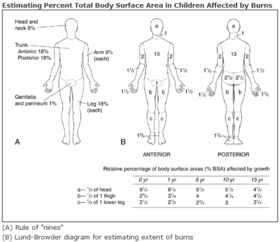Lund and Browder chart
| Lund and Browder chart | |
|---|---|
 The Lund and Browder Chart was first published in 1944 and was based on experience treating victims of the 1942 Cocoanut Grove fire | |
| Specialty | Emergency medicine/dermatology |
The Lund and Browder chart is a tool useful in the management of burns for estimating the total body surface area affected. It was created by Dr. Charles Lund, Senior Surgeon at Boston City Hospital, and Dr. Newton Browder, based on their experiences in treating over 300 burn victims injured at the Cocoanut Grove fire in Boston in 1942.[1]
Unlike the Wallace rule of nines, the Lund and Browder chart takes into consideration the age of the person,[2] with decreasing percentage BSA for the head and increasing percentage BSA for the legs as the child ages, making it more useful in pediatric burns.
See also
References
- ^ Lund CC, Browder NC (1944). "The estimation of areas of burns". Surg Gynecol Obstet. 79: 352–8.
- ^ Hettiaratchy, S. Papini, R (July 2004). "ABC of burns: Initial management of a major burn: II—assessment and resuscitation". BMJ. 329 (7457): 101–103. doi:10.1136/bmj.329.7457.101. PMC 449823. PMID 15242917.
{{cite journal}}: CS1 maint: multiple names: authors list (link)
